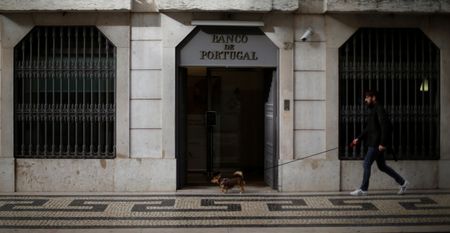By Sergio Goncalves
LISBON (Reuters) -The Bank of Portugal on Friday lowered its 2023 economic growth forecast to 1.5% from 2.6% predicted in June, expecting a sharp slowdown after this year’s 6.8% expansion as inflation and rising interest rates are likely to hit private consumption.
In its December economic bulletin, the central bank expected Portugal’s euro area-harmonized inflation to decelerate in 2023, but still remain at a high level of 5.8% after 8.1% this year.
Portuguese harmonized inflation clocked 10.2% year-on-year in November, just off a three-decade high of 10.6% recorded in October, stoked by soaring energy and food prices.
The bank said in a statement that “growth will be contained in the first half of 2023, against a background of global uncertainty, erosion of purchasing power, tightening financial conditions and weakening external demand”.
From the second half of next year it expects activity to gather steam amid a potential “ease of tensions in energy markets” and gradual recovery of real income, projecting gross domestic product to then expand by around 2% in 2024 and 2025.
The central bank sees private consumption – which represents two-thirds of gross domestic product – almost stagnating next year after growing 5.9% in 2022 as families struggle with high inflation as well as rising interest rate hikes.
The European Central Bank on Thursday raised its key rate by 50 basis points to 2%, moving further away from a decade of ultra-easy policy.
Given the foreseeable strong slowdown or even recession in some of its major European trading partners, the Bank of Portugal expected exports to grow just 4.3% next year after 17.7% in 2022.
It sees gross fixed capital formation, which measures investment, increasing 2.9% next year, more than double this year’s pace, with the help of European relief funds.
The unemployment rate is expected to end this year at 5.9%, its lowest annual mark in two decades, and stay at that level in the next three years.
Harmonized inflation should slow to 3.3% in 2024 and 2.1% in 2025 – close to the ECB’s medium-term objective, it said.
(Reporting by Sergio Goncalves; Editing by Andrei Khalip and Raissa Kasolowsky)

